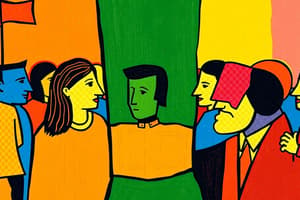Podcast
Questions and Answers
Define the relationship between the state and civil society in politics and explain its dynamics. Provide an example from your journal entries and in-class discussion.
Define the relationship between the state and civil society in politics and explain its dynamics. Provide an example from your journal entries and in-class discussion.
The relationship between the state and civil society in politics refers to the interaction and interdependence between the government and the various non-governmental organizations, institutions, and individuals within a society. Civil society represents the organized expression of citizens' interests, activities, and initiatives outside of the state. It acts as a check on the state's power and plays a crucial role in shaping public opinion and influencing government policies.For example, in my journal entries and in-class discussion, we explored how civil society organizations such as non-governmental organizations (NGOs), trade unions, and grassroots movements play a vital role in advocating for social justice and human rights. These organizations often engage in lobbying, protests, and advocacy campaigns to bring attention to important issues and hold the state accountable for its actions. The dynamics of this relationship can vary depending on the level of democracy and government responsiveness to civil society demands.
Discuss a strength and a weakness of coercion in the context of the state. Provide examples.
Discuss a strength and a weakness of coercion in the context of the state. Provide examples.
One strength of coercion in the context of the state is its ability to maintain law and order, ensuring the stability and security of a society. Coercive measures such as the use of police forces and legal systems can deter criminal activities and protect citizens from harm.However, a weakness of coercion is that it can lead to abuses of power and violations of human rights. Excessive use of force by the state can result in the suppression of dissent, infringement of civil liberties, and unequal treatment of individuals or groups. For example, during protests against government policies, the use of excessive force by law enforcement can result in injuries or even deaths of peaceful demonstrators. Such instances highlight the problematic nature of coercion when it is not exercised with restraint and respect for human rights.
Explain the relationship of political studies to the practice and process of politics. How does authority get enacted according to Weber's terms? Provide short examples.
Explain the relationship of political studies to the practice and process of politics. How does authority get enacted according to Weber's terms? Provide short examples.
Political studies contribute to the understanding and analysis of the practice and process of politics. They provide insights into the structures, institutions, and dynamics of political systems, helping individuals comprehend the complexities of power, decision-making, and governance.According to Weber, authority is enacted through three types: traditional authority, charismatic authority, and legal-rational authority. Traditional authority is based on customs, traditions, and hereditary power, such as monarchies or tribal leadership. Charismatic authority stems from the personal qualities and appeal of a leader, who inspires followers through their exceptional qualities or ideas. Legal-rational authority is based on formal rules, laws, and procedures, where power is derived from legitimate positions within a bureaucratic system.For example, in the context of political studies, a traditional authority can be seen in the monarchies of countries like Saudi Arabia, where power is inherited within the royal family. Charismatic authority can be observed in leaders like Nelson Mandela, who inspired people with his vision of a united and democratic South Africa. Legal-rational authority can be seen in the role of elected officials in democratic countries, where power is derived from the legitimacy of winning elections and holding public office.
Explain the transition from egalitarian, kinship-based modes of organization to inegalitarian forms with centralized authority. What factors contributed to this transition?
Explain the transition from egalitarian, kinship-based modes of organization to inegalitarian forms with centralized authority. What factors contributed to this transition?
Flashcards are hidden until you start studying




